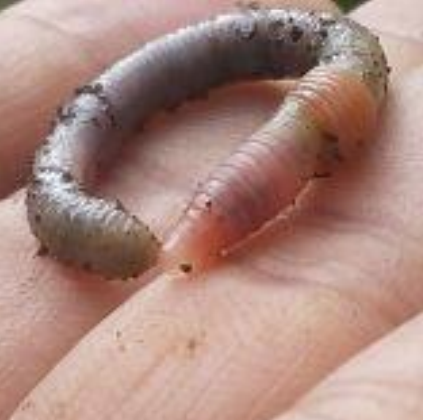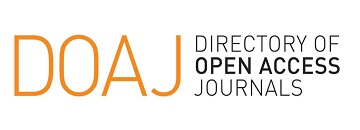No-till farming activites in some Umanapu (agroforestry land) on earthworm diversity: a case study in Detusoko District, Ende Regency

Downloads
Downloads
Ayuke, F. O., Pulleman, M. M., Vanlauwe, B., Goede, R. G. M. De, Six, J., Csuzdi, C., & Brussaard, L. (2011). Agriculture, ecosystems and environment agricultural management affects earthworm and termite diversity across humid to semi-arid tropical zones. Agriculture, Ecosystems and Environment, 140(1–2), 148–154.
Bhadauria, T., Kumar, P., Kumar, R., Maikhuri, R. K., Rao, K. S., & Saxena, K. G. (2012). Earthworm populations in a traditional village landscape in Central Himalaya, India. 53, 83–93.
Brasil, E. C., Dantas, R. C. R., Silva Júnior, M. L. da, & Gama, M. A. P. (2020). Phosphorus fraction in a yellow latosol cropped under no-tilage system in the Brazilian Amazon. Journal of Agricultural Studies, 8(3), 484-504.
Dewi, W. S. (2013). Pengaruh cacing tanah dan bahan organik terhadap dinamika populasi mikrobia beberapa jenis tanah. Sains Tanah - Journal of Soil Science and Agroclimatology, 1(2), 43-52.
Dharma, I. P., & Puja, I. N. (2019). Pengaruh frekuensi pengolahan tanah dan pupuk kompos terhadap sifat fisik tanah dan hasil jagung. Agrotrop : Journal on Agriculture Science, 9(2), 154-165.
Fonte, S. J., Barrios, E., & Six, J. (2010). Geoderma earthworms, soil fertility and aggregate-associated soil organic matter dynamics in the Quesungual agroforestry system. Geoderma, 155(3–4), 320–328.
Gbarakoro, T. N., & Zabbey, N. (2013). Soil mesofauna diversity and responses to agro-herbicide toxicities in rainforest zone of the Niger Delta , Nigeria Department of Animal Science and Fisheries , Faculty of Agriculture. Applied Journal of Hygiene, 2(1), 1–7.
Hairiah, K., Sulistyani, H., Suprayogo, D., Widianto, Purnomosidhi, P., Widodo, R. H., & Van Noordwijk, M. (2006). Litter layer residence time in forest and coffee agroforestry systems in Sumberjaya, West Lampung. Forest Ecology and Management, 224, 45–57.
Jose, S. (2009). Agroforestry for ecosystem services and environmental benefits: an overview. Advances in Agroforestry, 1–10.
Kuntz, M., Berner, A., Gattinger, A., Scholberg, J. M., Mäder, P., & Pfiffner, L. (2013). Influence of reduced tillage on earthworm and microbial communities under organic arable farming. Pedobiologia - International Journal of Soil Biology, 56(4–6), 251–260.
Kusumarini, N., Sayifudin, S., Dwi Kautsar, F., & Syekhfani, S. (2020). Peran bahan organik dalam menurunkan dampak paparan pestisida terhadap kesuburan tanah dan serapan hara tanaman sawi. Jurnal Tanah dan Sumberdaya Lahan, 7(1), 127–133.
Langmaack, M., Schrader, S., & Helming, K. (2001). Effect of mesofaunal activity on the rehabilitation of sealed soil surfaces. Applied Soil Ecology, 16(2), 121–130.
Lapied, E., Nahmani, J., & Rousseau, G. X. (2009). Influence of texture and amendments on soil properties and earthworm communities. Applied Soil Ecology, 43, 241–249.
Mambrasar, R., Krey, K., & Ratnawati, S. (2018). Keanekaragaman, kerapatan, dan dominansi cacing tanah di bentang alam Pegunungan Arfak. Vogelkop: Jurnal Biologi, 1(1), 22-30.
Noordwijk, M. Van, Agus, F., Suprayogo, D., Hairiah, K., Pasya, G., Verbist, B., … Box, P. O. (2004). Peranan agroforestri dalam mempertahankan fungsi hidrologi daerah aliran sungai (DAS). Agrivita, 26(1), 1–8.
Romarta, R., Yaherwandi, Y., & Efendi, S. (2020). Keanekaragaman semut musuh alami (Hymenoptera: Formicidae) pada Perkebunan Kelapa Sawit Rakyat di Kecamatan Timpeh Kabupaten Dharmasraya. Agrikultura, 31(1), 42-51.
Roger, P., Simpson, I., Oficial, R., Ardales, S., & Jimenez, R. (1994). Effects of pesticides on soil and water microflora and mesofauna in wetland ricefields: a summary of current knowledge and extrapolation to temperate environments. Australian Journal of Experimental Agriculture, 34(7), 1057-1068.
Rowe, E. C., Noordwijk, M. V., Suprayogo, D., & Cadisch, G. (2005). Nitrogen use efficiency of monoculture and hedgerow intercropping in the humid tropics. Plant and Soil, 268(1), 61–74.
Saga, A. J. A., Sine, H. M. C., & Lehar, L. (2020). Soil worms population in various little quality (C, N, C/N, lignin, and polyphenol) (Case study on agroforestry land in Kelimutu National Park, Ende Regency-Indonesia). Granthaalayah, 8(1), 124–130.
Smith, R. G., Mcswiney, C. P., Grandy, A. S., Suwanwaree, P., Snider, R. M., & Robertson, G. P. (2008). Diversity and abundance of earthworms across an agricultural land-use intensity gradient. Soil & Tillage Research, 100, 83–88.
Sudjana, B. (2018). Perbaikan tanah inceptisol Karawang oleh cacing (Lumbricus rubellus) dan mulsa organik serta kajian potensi terjadi erosi akibatnya. Paspalum: Jurnal Ilmiah Pertanian, 1(2), 62-73.
Sujak, S., Sunarto, D. A., & Subiyakto, S. (2018). Pengaruh penambahan biomassa di lahan kering terhadap diversitas Arthropoda tanah dan produktivitas tebu. Buletin Tanaman Tembakau, Serat & Minyak Industri, 10(1), 21-31.
Wahyunie, E. D., Sinukaban, N., & Damanik, B. S. D. (2012). Perbaikan kualitas fisik tanah menggunakan mulsa jerami padi dan pengaruhnya terhadap produksi kacang tanah. Jurnal Ilmu Tanah dan Lingkungan, 14(1), 7.13.








